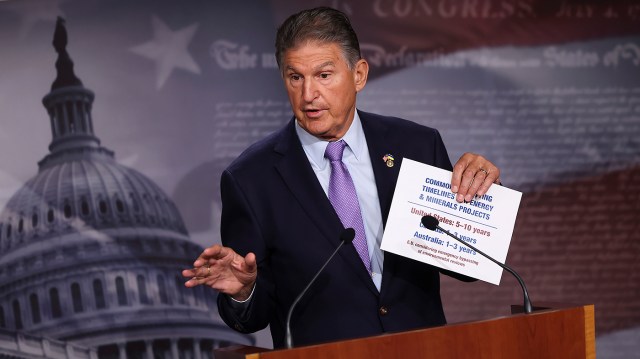
Xan Fishman
@XanFishman
Followers
1,374
Following
747
Media
160
Statuses
2,343
Husband of @KCassling - Father of 2 daughters - Senior Director, Energy Program @BPC_Bipartisan - Former @johndelaney Chief of Staff. Views my own
Joined March 2011
Don't wanna be here?
Send us removal request.
Explore trending content on Musk Viewer
Halloween
• 2450755 Tweets
Mark Cuban
• 521202 Tweets
Thug
• 478038 Tweets
Sant Rampal Ji
• 234126 Tweets
Christmas
• 171576 Tweets
Corinthians
• 155236 Tweets
Raj Musix Kannada
• 142109 Tweets
Racing
• 127218 Tweets
Jets
• 107458 Tweets
Cazzu
• 96074 Tweets
Fate
• 92647 Tweets
Mariah
• 71477 Tweets
#BAEMON_DRIP_OUTNOW
• 65520 Tweets
#WelcomeHomeJAYB
• 62183 Tweets
#GMMTVStarlympics2024
• 60974 Tweets
Nodal
• 55176 Tweets
Texans
• 41970 Tweets
Juanfer
• 40348 Tweets
Happy New Month
• 31734 Tweets
Noroña
• 30808 Tweets
Alito
• 26812 Tweets
Rodgers
• 24984 Tweets
Garrett Wilson
• 24392 Tweets
TAEMIN
• 24045 Tweets
ガンダムW
• 24003 Tweets
Garro
• 22042 Tweets
紅茶の日
• 18604 Tweets
Stroud
• 16092 Tweets
モンハン
• 16027 Tweets
キャラクリ
• 15935 Tweets
Hayırlı Cumalar
• 14821 Tweets
lil uzi
• 14191 Tweets
Ramon Diaz
• 14026 Tweets
危険運転
• 12881 Tweets
Last Seen Profiles
I don’t know if the scientists that signed on didn’t actually read the letter or if they just didn’t bother to read the modeling that the letter criticizes. There are areas where reasonable people can have different opinions. But this letter is simply factually incorrect.
A Letter from 118 U.S. Scientists on the Climate Impacts of the Energy Permitting Reform Act
TO:
@SenateDems
@SenateGOP
@HouseDemocrats
@HouseRepubs
@MichaelEMann
@350
@billmckibben
@howarth_cornell
@ultracricket
@ClumpedIsotopes
@Prof_FSultana
@mzjacobson
36
69
141
4
20
126
7. Increases the authority of
@FERC
to site electric transmission lines and fairly allocate costs. Replaces corridors concept with determination of national interest for specific transmission lines. This is probably the most important component of the whole bill. 8/
1
17
73
Great conversation today about inflation. Here's my favorite quote from
@JustinWolfers
on why gas tax holidays are a bad idea.
5️⃣ minute heads up! We're about to go live with
@ShaiAkabas
,
@DennisCShea_
,
@XanFishman
,
@DianeSwonk
, and
@JustinWolfers
.
0
9
9
0
19
62
I'm a sucker for a good map that conveys new information.
@rorypjacobson
@ugbaad_kosar
and the team over at
@carbon_180
made a really nice one on siting DAC hubs. kudos.
5
14
59
Yes. This is counterintuitive to some, but the crux of the issue is that electrification DOES NOT EQUAL decarbonization. If we electrify without a massive buildout of transmission lines, the result is more fossil fuel use because we won't be able to get renewables onto the grid.
"The analysis (by
@JesseJenkins
) found that if the US builds out transmission lines at the pace of the past 10 years (a glacial 1% annually), it would result in more coal and natural-gas consumption in 2030 than if the green energy-focused Inflation Reduction Act hadn’t passed."
8
58
326
2
12
45
13 years of marriage with
@kcassling
. 5 stars. Strongly recommend. (For me. Not you. Back off. You have to find your own mate)
3
0
46
“In essence, permitting reform is the missing piece, the sine qua non, of our national energy policy.”
Check out my new oped on permitting reform in
@thehill
Permitting reform is bipartisan, crucially important, and possible. Let’s do it!
0
16
46
Love to see the support for the bipartisan permitting bill continue to grow. We can make people’s lives better with cheaper, more reliable energy and reduce emissions at the same time. There’s a reason why Democrats and Republicans can work together on this.
I was glad to see
@Sen_JoeManchin
&
@SenJohnBarrasso
advance their strong, bipartisan permitting reform bill out of committee last week. This bill is needed to accelerate American efforts to decarbonize our growing economy & strengthen our energy security and that of our allies.
8
31
107
0
5
45
Great quote on permitting reform from
@RepScottPeters
at the
@USChamber
“No is the second best answer”
Permitting reform is about having an efficient process to get to yes or no. It’s not about ramming through bad projects. We can have high standards and an efficient process.
2
11
38
8.Adds Hydrogen into the definition of “natural gas” in order to give
@FERC
clear regulatory authority of hydrogen pipelines. 9/
1
3
39
carbon implies the existence of carboff.
Shoutout to everyone on
#energytwitter
working their carboff today to get👏CO2👏OUT👏OF👏THE👏ATMOSPHERE👏
3
3
42
As House Republicans are holding hearings on permitting reform with the BUILDER Act from
@RepGarretGraves
, Sen.
@ChrisCoons
is here at BPC also talking about the importance of permitting reform. This is a bipartisan policy priority that we can and will get done.
1
7
40
I'll be speaking about permitting reform next week at the National Press Club. Should be a great event put on by
@thehill
featuring
@SenatorHick
@RepJohnCurtis
and more! Register here:
3
14
39
Yesterday, House Republicans passed H.R. 1 which included permitting reform for energy projects. Today, Democrats
@RepScottPeters
&
@SenAngusKing
have an op-ed calling for permitting reform for energy projects. A bipartisan deal is possible and necessary!
2
8
35
How many times can I like this tweet? border carbon, permitting reform, bipartisan agreement. We're going to get this permitting reform deal done. Don't let typical D.C. pessimism hold sway. This is too important.
2
1
37
Really enjoyed chatting with these two leaders in the Climate & Trade space this week. Lots of momentum. Exciting!
@SenWhitehouse
@SenBillCassidy
@BPC_Bipartisan
2
1
35
And the bipartisan Climate and Trade hits keep on rolling this week.
@RepJohnCurtis
&
@RepScottPeters
just introduced the House version of the bipartisan Prove It Act. We'll have a fireside chat with them to discuss tomorrow at our Climate & Trade Summit.
3
4
33
Big bipartisan vote in favor of Prove It Act. You love to see it. Congrats to
@SenCoonsOffice
and
@SenKevinCramer
NOW: PROVE It Act easily advanced through
@EPWCmte
by a 14-5 vote, with handful of Republicans in support
0
8
35
0
9
31
This Wednesday at 11am, I'm sitting down with
@WhiteHouse
Senior Advisor
@johnpodesta
to discuss Permitting Reform live
@BPC_Bipartisan
.
What questions should I ask him?
5
16
32
“If we’re not talking about policy that can pass, we’re merely a debating society” -
@SenBillCassidy
As the gen z kids say, So True.
0
6
35
Upshot here is that “denying Manchin a win” is now gone as a barrier to bipartisan permitting reform, which increases the odds of getting it done.
4
4
28
Some ~professional~ news:
I've joined the amazing team at the Bipartisan Policy Center as Director of Energy Policy & Carbon Management.
Excited to be working on energy policy and fighting climate change with
@JasonGrumet
,
@SashaMackler
, Lesley Jantarasami, and the whole team.
1
1
32
Great conversation yesterday on permitting reform with
@RepBuddyCarter
@RepScottPeters
@RepHoulahan
&
@RepGarretGraves
. I believe we can get a bipartisan permitting reform bill passed into law this year. Video in thread below if you missed the event.
@imaginephotographydc
2
8
32
The new Carbon Negative Shot program
@ENERGY
is worth celebrating. Investing in Carbon removal is crucial for Net-Zero. Help me celebrate with your own shot for Carbon Negative Shot.
3
2
31
Disappointed that Biden didn’t mention need for permitting reform in
#SOTU
last night. Lots of well-deserved hype for bipartisan infrastructure law, CHIPS+S, & clean energy tax credits. But w/o permitting reform, the climate and economic benefits will be less than advertised.
0
4
28
@DoctorVive
@JesseJenkins
@rff
The key issue is that both of those potential emissions increases added together are less than the emissions benefits from the bipartisan permitting reform bill. That’s why if you care about climate change, it’s a deal worth taking.
1
1
29
Took the day off to go hiking with
@kcassling
for our 12 year wedding anniversary. Good choice today. Even better choice 12 years ago.
1
0
27
Good news! We ranked this policy option as "promising" in our Goldilocks Permitting Reform report:
1
7
28
🚨Breaking!🚨
@ENERGY
just released a Request For Information on revising and creating categorical exclusions.
Exactly what our Smarter, Cleaner, Faster Infrastructure Task Force called for in the 3rd recommendation from our CE paper in Sept.
1
8
23
I have to admit,
#HotFERCsummer
was fun, and I’m said to see it end. FERC and transmission infrastructure in general don’t get the love and attention they deserve. Kudos to
@RepCasten
for driving interest.
2
3
26
If this is a tactic to nudge Republicans to the negotiating table...fine...but as an actual tactic, it leaves a lot to be desired. We need LEGISLATION for policy certainty to launch infrastructure deployment at scale. FERC majorities can flip. Policy flip-flops stifle investment.
lots of permitting talk on the hill tomorrow.
@EnergyDems
hearing on bipartisan package. but with Dems aghast at how much Rs are demanding, Schumer and others are turning to FERC & elsewhere. but FERC is tricky -- both politically and technically
2
8
22
2
3
25
Excited to hear about the White House’s new Climate and Trade Task Force. At
@BPC_Bipartisan
, we’ve been digging deep on this issue for the past several years. The issue is ripe and bipartisan. Looking forward to action.
1
1
24
More momentum in the Climate-Trade space. Very happy to see
@BillCassidy
's thought leadership in this space. Bipartisan progress is possible here.
SCOOP: Senate Republicans introduce a climate bill — aimed at China. Got an exclusive look at
@BillCassidy
's long-awaited foreign pollution fee bill, which drops today and is the first GOP-led proposal to inject climate change policy into U.S. trade rules
9
47
132
0
3
23
Rise and Shine! It’s Permitting Day! Let’s do this!
0
1
24
I would be lying if I didn't say I was sad at this news. When
@JasonGrumet
recruited me to join
@BPC_Bipartisan
2 years ago, I was excited about working towards the vision of the organization. But I was just as excited about the chance to work with Jason 1/
Over the last 15 years at
@BPC_Bipartisan
, I have had the time of my life engaging in good arguments, leading an incredible staff as they solve the nation’s toughest issues, and most importantly, keeping bipartisan collaboration alive in Washington, D.C.
15
12
121
1
0
22
The newest IPCC report is crystal clear "The deployment of CDR to counterbalance hard-to-abate residual emissions is unavoidable if net-zero CO2 or GHG emissions are to be achieved." Read more from
@LJantarasami
@CarolineNormile
@DannyBroberg
@Fellow_Meron
1
1
23
Agree. When considering options for decarbonizing, the right answer is usually AND, not OR.
2
1
23
This is an exciting bill from
@RepPaulTonko
and
@RepScottPeters
. The IPCC report made clear that CDR is crucial for achieving climate goals. Leveraging federal procurement to drive investment, innovation, and scale is smart policy.
Today
@RepScottPeters
and I introduced the Federal CDR Leadership Act to jump-start carbon removal in the United States.
Through this legislation, we can deploy innovative technologies, create good jobs & boost economic development all while combating the
#ClimateCrisis
!
8
21
75
0
2
22
My Takeaways:
1. Need to more than 2x pace of transmission buildout
2. If not, a) 80% of modelled IRA ghg reductions won't happen, and b) we !increase! domestic use of natural gas & coal
Can't 2x under current policy. Need legislation to improve siting/permitting/cost allocation.
NEW analysis out on the importance of electricity transmission expansion to unlock the full emissions reduction potential (& health benefits) of the
#InflationReductionAct
:
Read on to learn why 100s of millions of tons are at stake.
11
103
333
0
4
22
Great to see this new bill from
@SenKevinCramer
and
@ChrisCoons
. Linking climate and trade is an area of growing bipartisan interest, and it all starts with data. This is a space where policy and bipartisan politics align. Exciting!
New:
@ChrisCoons
and
@SenKevinCramer
will introduce a bipartisan bill today to lay the groundwork for America’s first carbon border tax.
6
52
102
1
4
21
Spent yesterday afternoon talking about permitting reform with the House Supply Chain Caucus. Great bipartisan leadership from
@RepDavidRouzer
@RepColinAllred
@RepDustyJohnson
and
@RepAngieCraig
0
2
22
Read my new oped in
@thehill
on Border Carbon Adjustments, and why I'm optimistic that there's a bipartisan path forward. Spoiler alert: China will be a key bipartisan motivator for action.
1
10
21
“I do think there is the opportunity to get something bipartisan done on climate”
-
@SenBillCassidy
#DACDay
#BPCLIVE
0
6
20






























































































